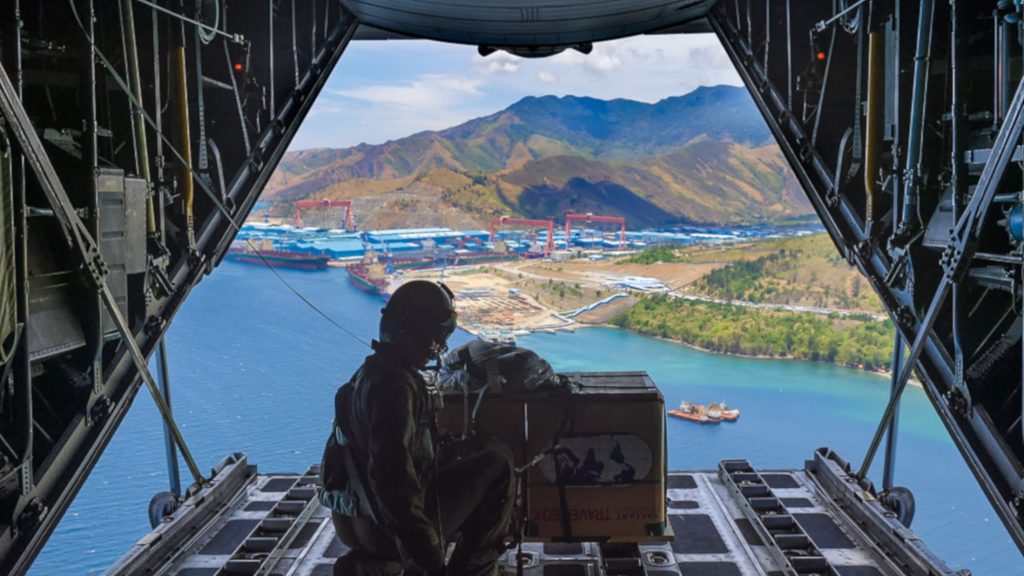Former US base offers hub for Beijing projects
A U.S. Air Force C-130 aircraft prepares to deploy a bundle near Subic Bay during annual joint training between the Philippine armed forces and the American military. (U.S. Air Force photo)
MANILA — Chinese companies have expressed interest in taking over the Philippines’ largest shipyard after the local unit of South Korea’s Hanjin Heavy Industries and Construction filed for rehabilitation this week.
At least two major Chinese shipbuilders have inquired about the operations of Hanjin Philippines, Trade Undersecretary Ceferino Rodolfo said on Friday. He declined to name the companies.
A successful bid by a Chinese company to take over the shipyard at Subic Bay, in a property that used to host U.S. forces, would symbolize the country’s increasing presence in the South China Sea. Beijing has been keen to enlarge its footprint around Subic with projects for liquefied natural gas and a railway.
The Philippine government wants a new investor for the shipyard, as it looks to safeguard thousands of jobs. Hanjin Philippines defaulted on $400 million in bank loans Tuesday, in what appears to be the island country’s biggest corporate default.
Those debts are in addition to the $900 million the unit owed to South Korean creditors. The shipyard builds commercial vessels such as big oil tankers and containerships.
Hanjin Heavy Industries and Construction’s shipyard in Busan, South Korea. After the company defaulted, its shipyard in the Philippines has attracted potential buyers. © Reuters
Davao-based tycoon Dennis Uy, who has interests in shipping and enjoys close ties with President Rodrigo Duterte, was reported to have looked at Hanjin last year. But Uy told the Nikkei Asian Review on Friday that he was “not interested” in the business.
Hanjin “has been a valued investor that helped us develop a pool of workers … We are looking at linking them up with other investors who have expressed interest in shipbuilding in the Philippines,” Rodolfo said.
The trade official, who met with Hanjin officials Thursday, said he hoped to find a white knight for the company as soon as possible.
The 300-hectare Hanjin site is one of the world’s biggest shipyards and has been the foundation for the country’s ambition to be a global shipbuilding hub. But the troubles for Hanjin Philippines reflect the headwinds faced by shipbuilders worldwide amid strong competition and overcapacity. Local reports also suggest the shipyard has suffered from a drop in new orders and the end of some public subsidies and tax breaks.
More than 7,000 Hanjin workers were laid off at Subic Bay in December, cutting the number of employees to just around 3,800 — a far cry from roughly 30,000 at the site’s peak, trade officials say. Additional job cuts loom if Hanjin fails to find new investors. The company is finishing two ships, and has eight more in the pipeline.
South Korea’s Hanjin has invested $2.3 billion since taking over the site in 2006, and has delivered 123 ships. The Philippines is the world’s fifth-largest shipbuilding economy, after China, South Korea, Japan and the European Union, although the top three account for more than 85% of market share.
Hanjin’s shipyard is the largest investment in Subic Bay, a former U.S. naval base north of Manila, which Beijing now eyes as an LNG hub. China also looks to build a rail system connecting it with Clark, a former U.S. air base.
The shipyard’s assets total 1.8 trillion won ($1.6 billion), accounting for 43.75% of parent firm Hanjin Heavy Industries, which spun off from Hanjin Group several years ago.
“The shipbuilding industry is going through a hard time, even though it hit the bottom in 2016,” said Jeong Dong-ik, an analyst at KB Securities. The analyst said Hanjin tried unsuccessfully to find investors last year.
Hanjin Heavy Industries’ stock price dropped 3.41% to 906 won on Friday, following a 12.74% fall on Thursday. Shares tumbled 27.42% on Tuesday when the rehabilitation was announced.
“It is inevitable that Hanjin Heavy is hit by the trouble in the Subic shipyard,” said an analyst at a South Korean brokerage house who requested anonymity. “However, I don’t think it can collapse the parent company.”
Shares of major Philippine banks holding Hanjin’s debt also fell Friday. Bank of the Philippine Islands lost 4.76%, Metropolitan Bank and Trust slid 4.82% while Rizal Commercial Banking dropped 9.12%. BDO Unibank stock slipped 2.67% before closing flat.
But the Philippine central bank insisted that local lenders’ exposure to Hanjin was “very negligible” relative to both total loans in the banking system and total foreign currency deposits.
“They can very well handle and manage this specific case,” Deputy Gov. Diwa Guinigundo said.
Meanwhile, the Subic Bay Metropolitan Authority said Hanjin had made a big contribution to the economy.
“It’s really sad that Hanjin is in dire financial straits after successfully building some of the world’s biggest ships here and putting the Philippines on the map as the world’s fifth-largest shipbuilder,” Chairwoman Wilma Eisma said.
Nikkei staff writer Kim Jaewon in Seoul contributed to this report.
Source: asia.nikkei.com/
